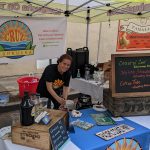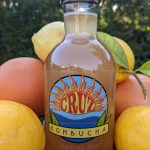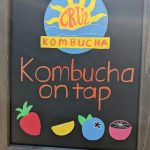Spilling the Tea: How Local Start-Up Cruz Kombucha became a growing and thriving local brand
It all started with a visit to a kombucha bar on Maui. The kombucha was light & refreshing. There was a sense of connection and community that created a very special experience. That feeling stuck with me. I couldn’t stop thinking about it and I knew I wanted to create something like that back home.
Kombucha is a fermented tea drink. You can use different types of tea and you can flavor it or drink it unflavored. I started to make kombucha in my home kitchen and experimented with various flavor combinations. I used different types of tea and flavored the batches with local organic fruits and herbs. I tried different lengths of fermentation and different pH levels. I would make small batches - a half or full gallon at a time. I’d drink it and would give it to a few friends and colleagues to try. I toured a local kombucha brewery - one that had been around for several years and was quite a large operation. It was hard to imagine going from brewing small batches in my kitchen to that size. I took an on-line Commercial Kombucha Brewing Masterclass. Their equipment, scale and volume was also quite large compared to what I was doing at home. Then I met someone who had a successful smaller operation. I introduced myself and over the course of a few months talked with her several times. She was generous with her time and answered my questions, let me shadow her at farmers’ markets and invited me to her commercial kitchen to check out her brewing and fermenting space. Once I saw her space I was even more energized. The idea of starting the business seemed more realistic and attainable and I was more committed than ever to give it a try.
What next? I researched the kombucha market in the U.S. and locally in the Bay Area. I learned more and more about the fermenting process. I wrote a basic starting business plan. I got my food handlers license. I reached out to the local Small Business Development Center to see what classes and resources they offered. I made the jump and decided to move into a commercial kitchen space. This gave me space to develop additional flavors and to brew in larger batches. I purchased some larger equipment (some new, some used) and got to work. The first few months were focused on developing a few core flavors. And getting used to brewing in a larger space and in larger vessels (and at different temperatures as we moved from winter to spring). I started to read about the process to apply to farmers markets. I learned what permitting, insurance and licensing was needed from cities, counties and the state to sell kombucha. I joined Kombucha Brewers International (association of commercial kombucha brewers) and attended my first Kombucha conference! I looked for sales and discounts on equipment and ingredients and bulk pricing options. I talked with local farms and producers about seasonal produce options and availability. I sketched out elements of a brand and logo and contacted a local artist who brought it to life. I came up with flavor names. I wanted the logo, brand and flavors to reflect the spirit and the beauty of the coast of California. I created a website and Instagram business account. I worked nights and weekends building out the kitchen and brewing operations , celebrating wins along the way and also learning from mistakes and mishaps.
I was invited to participate in two farmers’ markets. Our permitting came through and 4 months after moving into a commercial kitchen we had our first market! I had been a customer at farmers’ markets but had never sold at one. I read online about starting at farmers markets and talked with other vendors and learned the basics I would need to get started. Around this same time the kombucha business owner I had been talking to decided to move out of state and exit her business. She sold me some of her equipment, answered additional questions about evolving and scaling the business over time and introduced me to her commercial accounts (kombucha kegs on tap at local cafes, restaurants and breweries). I nervously dropped off samples and learned how to do sales visits. They all liked the Cruz Kombucha samples and placed their first orders. We coordinated her last delivery dates with my first delivery dates to those locations. Around the same time as those first commercial deliveries we also had our first farmers markets - these early accounts and markets were our first sales! We started to have new customers, repeat customers and referrals. We were getting contacted by individuals and businesses to learn more about our product and to participate in pop-ups and events. We made connections and dropped off samples and more businesses placed orders and became customers.
We are now available at farmers markets, local restaurants, breweries, coffee shops & events and have individual customers who order online. Word has gotten out about our kombucha and people are coming back again and again, including customers who come week after week to fill their bottles through our bottle refill and recycle program. We have gotten to know so many people through starting the business and that has been one of the most rewarding aspects of starting a small business. We really look forward to connecting at markets, events and out on deliveries to individuals and businesses. We donate a percent of sales to Common Roots Farm to raise awareness and as a way to give back to the community around us.
For more information about serving the best local kombucha on tap in your business or to learn about the benefits of kombucha such as improved digestion and immune system function go to www.cruzkombucha.com, @cruzkombucha on Instagram or contact info@cruzkombucha.com.




